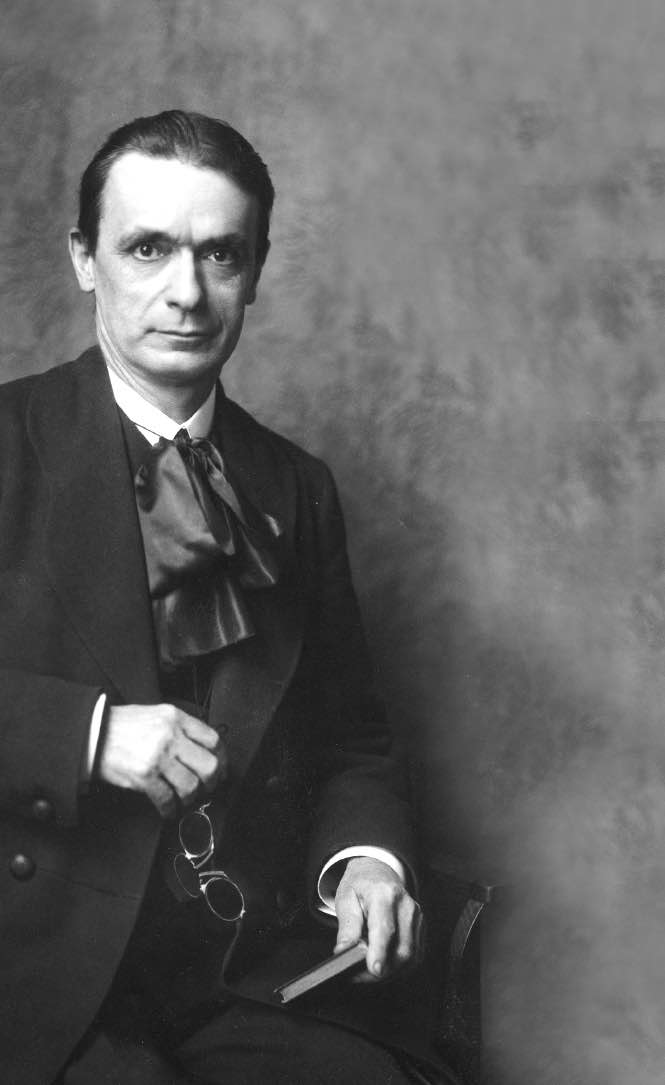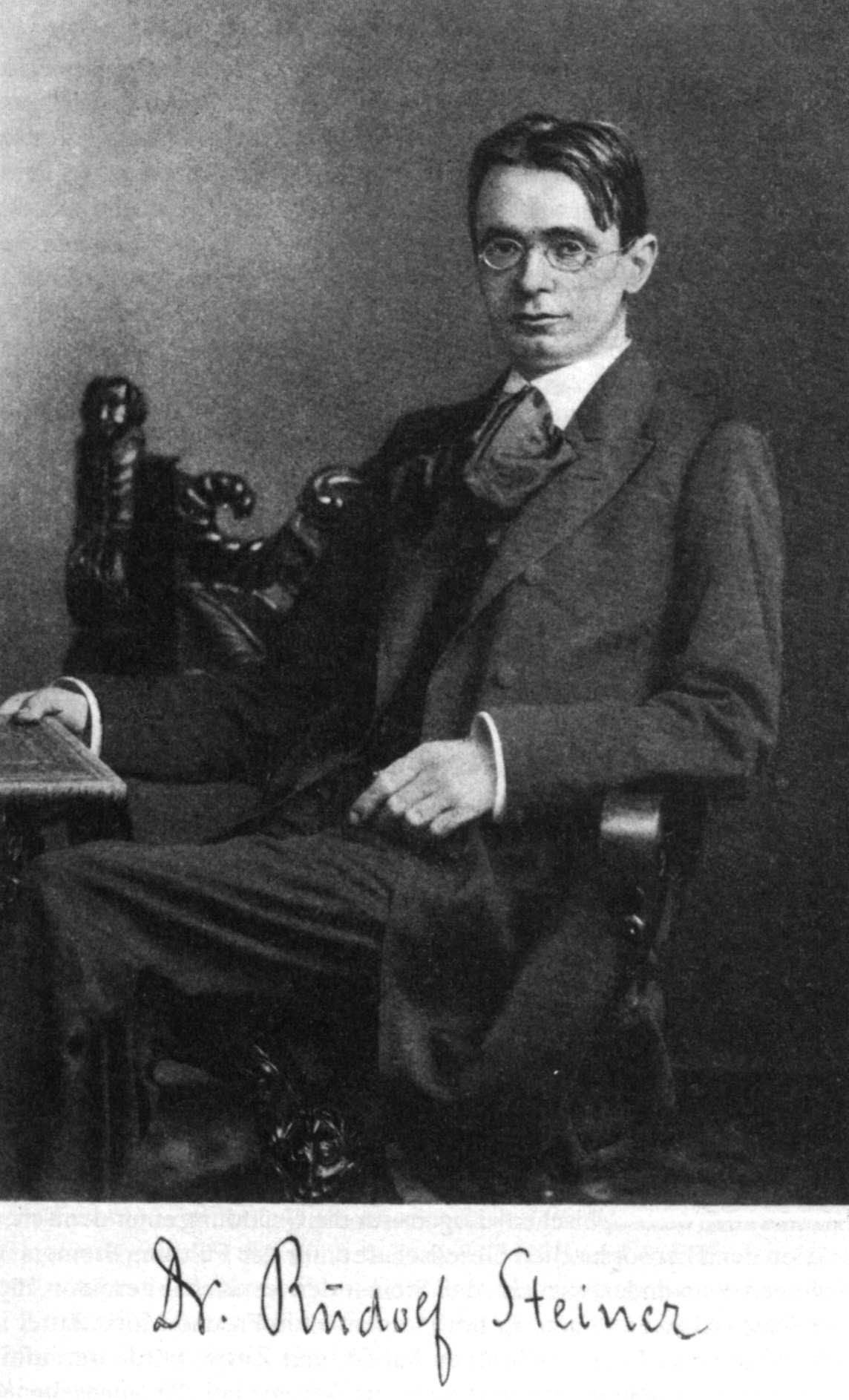
About the life of Dr Rudolf Steiner
Rudolf Steiner, a man already recognised during his lifetime as one of the greatest spirits in modern history, was born in Donji Kraljevec on 27 February 1861 – which was on the territory of the Austro-Hungarian Empire at the time.
Between 1893 and 1925, his name was ubiquitous in many areas of human activity, therefore it would not be an exaggeration to say that he left one of the deepest marks in the entire history of mankind.
However, if that mark were to be useful to everyone after him, it is necessary that later generations want to and be able to follow it. The chaotic and unfortunate events that occurred throughout the entire 20th century were marked with such an abundance of temptation of raw materialism that many lost the ability to recognise the significance of the light of such brilliance, thus he was forgotten by many. Nowadays, only a hundred years later, Rudolf Steiner’s name is omitted from numerous books that pretend to at least mention those personalities famous as bestowers of general well-being by elevating mankind in various fields of human activity.
In the last century, the entire state of the consciousness of mankind proved to be insufficiently mature to benefit from the profundity of Rudolf Steiner’s spiritual insights. The abundance and meaning of what he brought in the form of spiritual knowledge has a value, whose truth will survive and – similar to the fate of Aristotle’s works – illuminate a time that is yet to come.
In order to eliminate the possibility of an incorrect or even malicious interpretation of the very essence of what Steiner drew the attention of mankind to with his tireless efforts, it should be said that he offered mankind an approach to an essentially new way of thinking.
For a clearer picture, it should be known that the inner, spiritual state of man, beginning from the 15th century onwards, has changed significantly. Human thought has taken up the role of the deepest core of that change. The ability of analytical reasoning that we know do not doubt today started its rapid stride toward becoming a usual human ability. The most impressive external reflection of that event in the depths of the human soul was the staggering speed with which man realised that the Earth is round and that it circles around the Sun. Such a development of mental powers is focused, without interruption, to the impressions of the outside world obtained through the human senses (sight, hearing, touch…) and continued to this day. At the same time, it brought the human ability of cognition to the inability to answer questions penetrating the realm of the very soul and spirit. In time, thus described new powers of analytical reasoning admitted their inability to clearly understand those questions which are fatefully important for mankind. Therefore, dealing with this area of the human essence is labelled as something non-objective. And thus, the developed human ability to think left the questions of the human soul and spirit entirely to religion, which enabled it to rapidly and unilaterally focus on the increasingly narrow, purely sensory (material) areas of interest. The human consciousness of its own ability to think and the inextricably linked power of cognition finally reached a complete denial of the spiritual reality. This resulted in the universal prevalence of the materialistic view of the world.
By correctly examining such a lack of freedom the human thought was afflicted with, Rudolf Steiner indicated that it had to be rid of all prejudice in order to free the very through-creation process of the dependence on the impressions of the outside world. The living thought – as Steiner called it; thought unrelated to anything that our senses tell us; which has no origin in the material world, demonstrates that it is a purely spiritual process. The very beginning of such though enables the human cognition to enter into the realm of the human soul and spirit. It should be recalled here that man has experienced the presence of the spiritual world and his place in it as a reality since ancient history. With this attitude towards his though and using free will with full consciousness, man is able to live the spiritual reality as the fruit of his cognition.
In other words, Rudolf Steiner used his own example to indicate the possibility that, alongside his usual thought which is based on day-to-day impressions obtained through the senses, man can, with practice, master thinking whose content he can create on his own. The practice consists of repeated focusing of one’s attention through sheer will to a simple though, e.g.: “Warmth is being”. Through the effort that needs to be invested, thought becomes increasingly stronger, just like muscle strength when we are using our arms. Finally, we see that thought is also a type of exertion, touch, inner experience, just like the experience of muscle strength. Thus, after some time spent in such exercise, man begins to feel within himself an awakening of a feeling of something which he was not aware of before. Man can rightly experience that new thing as a hitherto unnoticed sense, like an eye or ear. The use of that sense – the awakened ability, revived thought – enables man, when he is fully, clearly conscious, to start approaching direct insight into the spiritual reality of himself. He then comes – not through the usual use of the intellect, but with a deep inner feeling of a consciousness that is more whole and clearer than the everyday one – to the realisation, as irrefutable as any basic scientific knowledge, that man’s being is not limited by birth and death. This method of understanding does not make man a dreamer, a person without a healthy sense of reality; on the contrary – the deeper he penetrates into the spiritual essence of the self, and then of the entire world, the more determined man becomes to act responsibly and truthfully, and to live a life full of love and compassion for the entire world.
The correctness of such thinking is attested by numerous testimonies about Steiner’s works, particularly after World War I. Anthroposophy, or the anthroposophic spiritual science – as he called that newly founded science of the spiritual reality that he consistently built up throughout the previous thirty years – became ubiquitous in all areas of human activity. It inspired new perspectives in various areas of human activity. By clarifying and describing in more detail this spiritual view of the world as well as emphasizing its significance for the entire further development of mankind, Rudolf Steiner laid the foundation of the development of what is known today across the world as biodynamic agriculture, Waldorf education, eurythmy, anthroposophical medicine, architecture, painting, rhetoric…

The timeliness and importance of the work of Rudolf Steiner stemmed from, as he said himself, the burning need of human souls, which is easily visible from the events that occurred in the early 1920s. In February 1922, he accepted the offer of a famous German concert agency for the organisation of public lectures across Germany in January and February. In the first two weeks of the tour, he spoke before 20,000 people. However, the number of his opponents grew proportionally to the interest in Rudolf Steiner. The second tour, in May 1922, exposed Steiner – first in Munich, then in Elberfeld – to life-threatening situations. The agitators at those lectures, who later turned to Nazism, saw a resolute enemy in him, his cosmopolitan social ideas and his inner attitude based on freedom. The tour was interrupted, but Steiner continued touring Europe. Never before modern history has there been such power as that which the audience could experience during this lectures. Bearing only that in mind, one can, at least feebly, experience the tense anticipation shared by up to 2,000 audience members every day, just before his lectures in June 1922 in Vienna, at the ten-day “East-West” conference. Or, one can feel the attention with which scientists, sociologists, psychologists, physicians, philosophers, artists, politicians and many other thinkers with often opposing views, gathered from all around the world, hung onto his every word. He spoke about the wholeness of the human being, the position of man in the world, the problems of the human race just after the Great War as well as their solutions…

In the same year, due to the examination of new impulses toward a more appropriate education system, he was invited to Oxford for a conference titled “Spiritual Values in Education and Social Life”. The conference was held under the auspices of the English Minister of Education, and “the focus of the entire conference was the person of Rudolf Steiner as well as his lectures, which made a particularly strong impression on the audience”, as reported by The Manchester Guardian in August 1922. It was there that he held nine lectures before the academic audience of the country with which Germany had waged bloody war just a few years before…
So, who was that man?
